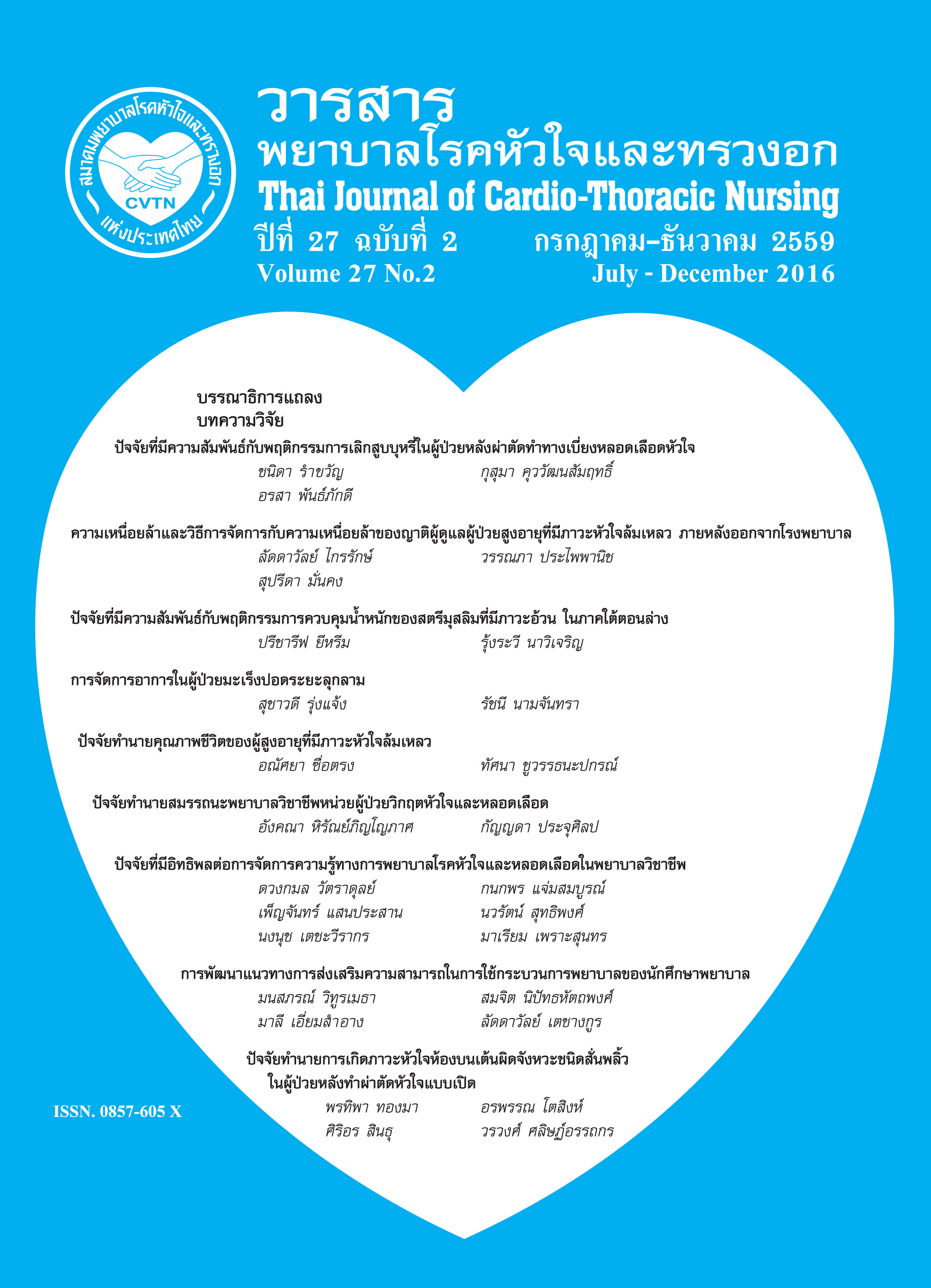ปัจจัยทำนายคุณภาพชีวิตของผู้สูงอายุที่มีภาวะหัวใจล้มเหลว
Keywords:
ผู้สูงอายุ, หัวใจล้มเหลว, คุณภาพชีวิต, older persons, heart failure, quality of lifeAbstract
การวิจัยแบบหาความสัมพันธ์เชิงทำนายนี้ มีวัตถุประสงค์เพื่อศึกษาคุณภาพชีวิตของผู้สูงอายุที่มีภาวะหัวใจล้มเหลว และปัจจัยด้าน เพศ อายุ ความรุนแรงของโรค ภาวะโรคร่วม ภาวะซึมเศร้า การสนับสนุนทางสังคม ในการทำนายคุณภาพชีวิตของผู้สูงอายุที่มีภาวะหัวใจล้มเหลว กลุ่มตัวอย่างคือ ผู้ที่มีอายุ 60 ปีขึ้นไป มีภาวะหัวใจล้มเหลว มารับการรักษาที่แผนกผู้ป่วยนอกอายุรกรรมหัวใจและหลอดเลือด โรงพยาบาลจุฬาลงกรณ์และโรงพยาบาลตำรวจ จำนวน 120 คน เครื่องมือที่ใช้ คือ แบบสอบถามข้อมูลส่วนบุคคล แบบวัดระดับความรุนแรงของโรค แบบประเมินภาวะซึมเศร้า แบบประเมินการสนับสนุนทางสังคม และแบบประเมินคุณภาพชีวิตของผู้ป่วยหัวใจล้มเหลว วิเคราะห์ข้อมูลโดยใช้ ความถี่ ร้อยละ ค่าเฉลี่ย ส่วนเบี่ยงเบนมาตรฐาน และสถิติการวิเคราะห์ถดถอยพหุคูณแบบเชิงชั้น
ผลการวิจัย พบว่า กลุ่มตัวอย่างร้อยละ 57.50 เป็นเพศชาย อายุเฉลี่ย 74.28 ปี กลุ่มตัวอย่างร้อยละ 73.34 มีโรคร่วมตั้งแต่ 3 โรคขึ้นไป ร้อยละ 54.17 มีความรุนแรงของภาวะหัวใจล้มเหลวในระดับน้อย ร้อยละ 60.80 ของผู้สูงอายุที่มีภาวะหัวใจล้มเหลวมีคุณภาพชีวิตอยู่ในระดับปานกลาง เพศ ภาวะโรคร่วม ความรุนแรงของโรค ภาวะซึมเศร้า และการสนับสนุนทางสังคมมีความสัมพันธ์กับคุณภาพชีวิต (p < .05) และภาวะซึมเศร้าสามารถทำนายคุณภาพชีวิตของผู้สูงอายุที่มีภาวะหัวใจล้มเหลวได้มากที่สุดโดยมีค่าสัมประสิทธิ์การถดถอยในรูปคะแนนมาตรฐาน เท่ากับ 0.66 รองลงมาได้แก่ ความรุนแรงของโรค การสนับสนุนทางสังคมและภาวะโรคร่วม โดยมีค่าสัมประสิทธิ์การถดถอยในรูปคะแนนมาตรฐาน เท่ากับ 0.26, 0.17 และ 0.15 ตามลำดับ และสามารถร่วมกันทำนายคุณภาพชีวิตได้ร้อยละ 53 (R2 = .53)
สรุปผลการศึกษา บุคลากรทางด้านสุขภาพควรให้ความสำคัญในการประเมินและป้องกันภาวะซึมเศร้ารวมทั้งส่งเสริมคุณภาพชีวิตผู้สูงอายุที่มีภาวะหัวใจล้มเหลวอย่างจริงจัง
Factors predicting quality of life in older persons with heart failure
The purposes of this predictive correlational study were to describe the quality of life in older persons with heart failure, and factors such as gender, age, severity of the disease, co-morbidity, depression, and social support to predict quality of life in older persons with heart failure. The sample were 120 people aged 60 years old and above, male and female, diagnosed heart failure from outpatient department, cardiovascular medicine unit, from Chulalongkorn Hospital and the Police General Hospital. The instruments were composed of demographic information, severity of disease, co-morbidity, Thai Geriatric Depressive Scale, social support, and Minnesota of Living with Heart Failure questionnaire. The data were analyzed using frequency, percentage, mean, standard deviation and stepwise multiple regression.
The results revealed that 57.50% were male, average age 74.28 years, 73.34% had at least 3 co-morbidity and 54.17% had less severity of heart failure. Most of older persons with heart failure was shown at moderate level (60.8 %) of quality of life. Factors significantly associated with quality of life of older persons with heart failure were sex, comorbidities, severity of the disease, depression, and social support (p < .05). Depression was the highest predicting factor on quality of life of older persons with heart failure (β =0.66), followed by the severity of disease Social Support And co-morbidity (β = 0.26 , 0.17 and 0.15) and were together predicted quality of life of older persons with heart failure 53% (R2 = .53).
Conclusion: Health personnel are required strongly assess and prevent depression and promote quality of life in older persons with heart failure.
Downloads
How to Cite
Issue
Section
License
บทความนี้ยังไม่เคยตีพิมพ์หรืออยู่ในระหว่างส่งไปตีพิมพ์ในวารสารอื่น ๆ มาก่อน และกองบรรณาธิการขอสงวนสิทธิ์ในการตรวจทาน และแก้ไขต้นฉบับตามเกณฑ์ของวารสาร ในกรณีที่เรื่องของท่านได้ได้รับการตีพิมพ์ในวารสารฉบับนี้ถือว่าเป็น ลิขสิทธิ์ของวารสารพยาบาลโรคหัวใจและทรวงอก






